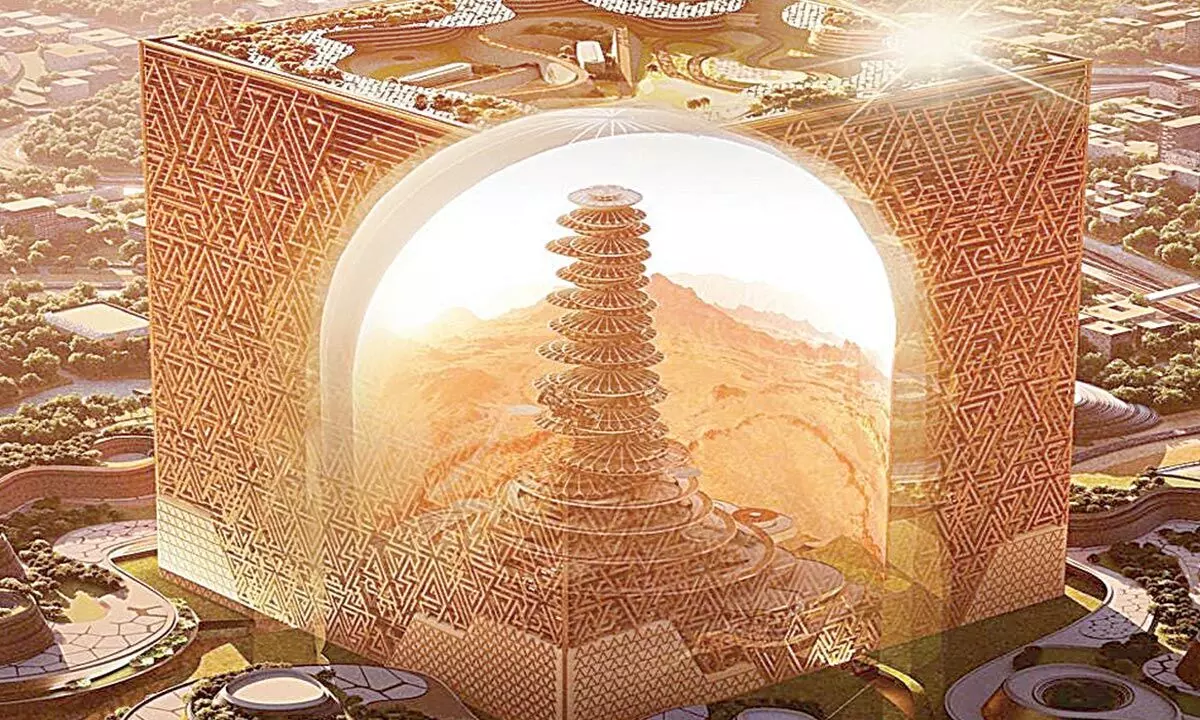Saudi development plans draw global indignation, devout slam structure’s design
The Mukaab project will add 180 billion riyals ($48 bn) to the Saudi economy and create 334,000 direct and indirect jobs
image for illustrative purpose

The building will be 20 times bigger than Empire State Building and be a one-stop location for shoppers and business owners, with more than 980,000 square metres of retail shops and 1.4 million square metres of office space. The Mukaab's core structure will be an atrium, allowing for tons of natural light and foliage to thrive inside.
Saudi Arabia has announced plans to build a large cube-shaped structure as part of a re-development project in the capital, Riyadh, triggering angry reactions from Muslims on social media, saying it resembles the Kaaba.
Saudi Arabia's Crown Prince Mohammed bin Salman (MbS) recently announced the launch of the New Murabba Development Company. It will oversee development of a new downtown area spread over 19 sq.km in Riyadh
Authorities claim that plans have been created keeping sustainability and environment in mind. The project includes green spaces, walking and cycling pathways to improve the quality of life and social interaction.
What is Mukaab?
The main feature of the project has been named the Mukaab, a gigantic cube structure that has been described as the future 'face of the city', while critics say it may even be the face of a new Saudi Arabia, focussing and generating more revenue through tourism than petroleum. At present, the plan is to fill the cube with 100,000 residential units as well as 9,000 hotel rooms.
In addition, it will also have over 80 entertainment and cultural venues, a museum and campus for a technology and design university. The 19 km space will accommodate thousands of people. The 25 million sq.mts. floor area is divided strategically into 104,000 residential units, 9,000 hotel rooms & 620,000 sq.mts. of leisure assets. An additional 980,000 sq.mts. will be covered by retail while 1.8 million sq.mt. will be dedicated for housing recreational facilities.
The building will be 20 times bigger than Empire State Building and be a one-stop location for shoppers and business owners, with more than 980,000 square metres of retail shops and 1.4 million square metres of office space.
The Mukaab's core structure will be an atrium, allowing for tons of natural light and foliage to thrive inside. The government brief promises an immersive 'gateway into another world' that is completely powered by the latest digital, virtual, and holographic technologies. In recent years, Saudi Arabia's abundance of oil money has sparked the design of some absolutely insane architectural projects.
In 2021, MbS announced $500 billion futuristic Neom city in the northwest of the country, with promises of robot maids, flying taxis and a giant artificial moon. And last year, he unveiled a giant linear city, The Line, which aims to stretch over 106 miles and house 9 million people. The one-trillion-dollar project will essentially be its own massive city in the middle of a desert once it's finished.
A new Kaaba?
Authorities claim that the project will add 180 billion riyals ($48 bn) to the Saudi economy and "create 334,000 direct and indirect jobs", though the cost of the gargantuan project has not been mentioned.
New Murabba (square) and the Mukaab were widely ridiculed by social media users, both within and outside Saudi Arabia, apart from a large number of Muslims all across the globe, as soon as the plans were announced.
The Mukaab was also denounced for its likeness to the most important cube-like structure in Saudi Arabia and the Islamic world: the Kaaba. During namaaz, Muslims around the world face towards the structure in the centre of the Grand Mosque in Mecca, and circumambulate it during Haj and Umrah pilgrimages.
Though one would have expected a much more vociferous outcry from the clerics in Saudi Arabia, it has not happened as they can't unyoke clutches of the ruling dispensation.
In India, the All India Shia Personal Law Board has condemned the project.
In a statement, general secretary of the Board Maulana Yasoob Abbas said the Saudi government was deeply hurting the religious sentiments of Muslims by building a structure that resembles the Kabaa. Maulana Abbas said a massive movement would be launched to oppose this project. The first protest will be held at the Imambara in Lucknow on March 5.
Why this new developmental push?
Apparently, it seems that Saudi Arabia has embarked on an ambitious project to diversify the economy away from oil and shed its image as a conservative, closed-off state, besides promoting new narratives of development and progress.
Additionally, it has serious regional competition from neighbouring Dubai and the Qatar capital Doha, both of which have for decades tried to position themselves as regional tourism and investment hubs.
The kingdom already has an $800 billion plan to double the size of the capital in the next decade, as well as transform it into a cultural and economic hub for the region, according to Saudi media.
Over the years Saudi Arabia has seen an economic boom, thanks to its petroleum industry.
It also earns billions in revenue from the Umrah and Haj pilgrimages. In recent years, it has made travel to the kingdom friendlier for the pilgrims and expansion plans in the two holy cities of Mecca and Madinah are underway to accommodate more tourists.
As a strategy it is also promoting the Umrah pilgrimage more than the annual Haj, as the revenues through Umrah pilgrims flows throughout the year and the government is not forced to spend more on providing facilities and security to Umrah pilgrims, whose stay is much shorter as compared to the Haj pilgrims.
So far, the government was focussing more on promoting tourism, but with the ascension of MbS, it seems to have changed tracks.
As his critics say he is pursuing a growth plan which seems more 'unIslamic' than his parleys with the Israelis.
(The writer is a Delhi-based political commentator)

